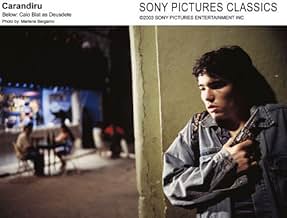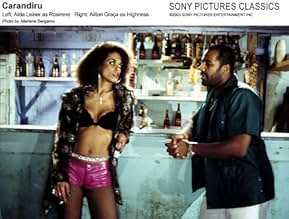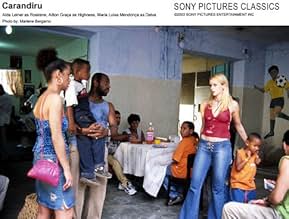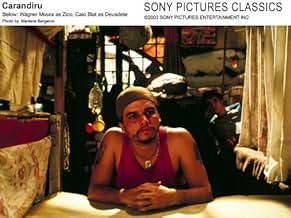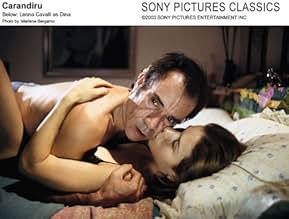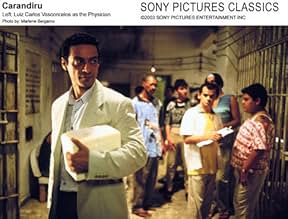Stories of crime, revenge, love, and friendship at the Carandiru Penitentiary, the largest prison in Latin America.Stories of crime, revenge, love, and friendship at the Carandiru Penitentiary, the largest prison in Latin America.Stories of crime, revenge, love, and friendship at the Carandiru Penitentiary, the largest prison in Latin America.
- Awards
- 16 wins & 33 nominations total
Enrique Diaz
- Gilson
- (as Enrique Díaz)
Aida Leiner
- Rosirene
- (as Aída Leiner)
Featured reviews
Despite what some reviews and reviewers state, Carandiru is, for the large part, gloriously human and humane, without ever resorting to mawkish sentimentality. The story is based on a real event and when I saw it on TV some years ago and I so much wanted to see it again, I bought the DVD, now cheap.
Yes, these characters are a handful of long-term convicts in one of largest prisons in the world - 7000 of them, in one (in San Pualo, Brazil), that's designed for 'only' 4,000 and we are introduced to them and their frank, matter-of-fact lives as they describe their drug and sex life 'inside' to the wonderfully open and compassionate doctor ( Luiz Carlos Vasconcelos). It's from his perspective as, part of his training, he's thrown into the deep end as he tries to treat and educate prisoners about AIDS.
Amongst the knowing humour, there are tales of anguish, violence and heartache with the main character's stories being run as flashbacks. Most of the crime is petty but circumstance and poverty has dumped most of these damaged people into one huge melting pot, of squalor, STD's and drugs. One finds it surprisingly easy to be open and impartial about situations that could make your toes curl.
Despite the vivid colours used and the Latin music that gets played in and amongst this tapestry of a human jigsaw, where few of the pieces fit, mounting signs reveal an underbelly of unrest, a pressure-cooker that's about to boil over and when it does and armed police march in, the film turns dark, angry and really hits the viewer. I won't say why, though the closing epilogues do (very) partially redress some of what went on.
This is essential Brazilian drama. Gritty, hard-hitting, yes but if you've got the stomach for the excellent City of God, you'll have no trouble here. Buy it, watch it, you'll feel like a proper human being, I promise you.
Yes, these characters are a handful of long-term convicts in one of largest prisons in the world - 7000 of them, in one (in San Pualo, Brazil), that's designed for 'only' 4,000 and we are introduced to them and their frank, matter-of-fact lives as they describe their drug and sex life 'inside' to the wonderfully open and compassionate doctor ( Luiz Carlos Vasconcelos). It's from his perspective as, part of his training, he's thrown into the deep end as he tries to treat and educate prisoners about AIDS.
Amongst the knowing humour, there are tales of anguish, violence and heartache with the main character's stories being run as flashbacks. Most of the crime is petty but circumstance and poverty has dumped most of these damaged people into one huge melting pot, of squalor, STD's and drugs. One finds it surprisingly easy to be open and impartial about situations that could make your toes curl.
Despite the vivid colours used and the Latin music that gets played in and amongst this tapestry of a human jigsaw, where few of the pieces fit, mounting signs reveal an underbelly of unrest, a pressure-cooker that's about to boil over and when it does and armed police march in, the film turns dark, angry and really hits the viewer. I won't say why, though the closing epilogues do (very) partially redress some of what went on.
This is essential Brazilian drama. Gritty, hard-hitting, yes but if you've got the stomach for the excellent City of God, you'll have no trouble here. Buy it, watch it, you'll feel like a proper human being, I promise you.
Let's get things straight here, if you were drawn to this film due its comparisons to the equally magnificent City of God, you're going to be surprised. Aside from the fact that its a Brazilian film about criminals, there are few similarities. While City of God was an epic story of life in the slums of Rio De Janeiro, Carandiru is about much older criminals and the days leading up to the infamous Carandiru prison massacre.
However, this is not the non-stop assault on the senses of grim violence you might expect. In fact, only the last twenty minutes or so of the film deal with the massacre at all and the film instead concentrates on a much more human aspect to the carnage. Focusing on the character of the Doctor as he tries to raise awareness of AIDs in the prison, it revolves around his day to day life as he chats casually with the inmates, learning of their hopes, fears and more often than not, their reason for being in the prison in the first place. These are stories that range from sad, to touching to outright hilarity and you soon find yourself absorbed in this world of offbeat criminals, so much so that when the violence does erupt, it is all the more shocking for it.
There are differences to the normal, US prison drama as well. I'm not sure how the Brazilians run their penitentiaries, but here there are no uniforms and they are allowed many of the comforts of home, along with free reign of the prison yard. But these are still drab conditions, with multiple inmates crammed into a single room, sweltering in the intense heat of the tropical summer. And ultimately, the prison is a community, made of genuine individuals, rather than clear cut prison stereotypes. This is a masterful film, one of my top movies of all time.
However, this is not the non-stop assault on the senses of grim violence you might expect. In fact, only the last twenty minutes or so of the film deal with the massacre at all and the film instead concentrates on a much more human aspect to the carnage. Focusing on the character of the Doctor as he tries to raise awareness of AIDs in the prison, it revolves around his day to day life as he chats casually with the inmates, learning of their hopes, fears and more often than not, their reason for being in the prison in the first place. These are stories that range from sad, to touching to outright hilarity and you soon find yourself absorbed in this world of offbeat criminals, so much so that when the violence does erupt, it is all the more shocking for it.
There are differences to the normal, US prison drama as well. I'm not sure how the Brazilians run their penitentiaries, but here there are no uniforms and they are allowed many of the comforts of home, along with free reign of the prison yard. But these are still drab conditions, with multiple inmates crammed into a single room, sweltering in the intense heat of the tropical summer. And ultimately, the prison is a community, made of genuine individuals, rather than clear cut prison stereotypes. This is a masterful film, one of my top movies of all time.
Carandiru is a true hymn of humanity in all of us. What let the Brazilian riot squad shoot down over a hundred inmates was that following both prejudice and the professional drilling they had been subjected to, they regarded the rioters of 1992 as nothing but worthless scum. Bebenco does not defend his characters. Based on the eyewitness account of the prison physician, he presents us with assassins, murderers, robbers and drug-dealers who do not even claim they do not deserve their sentences (although many were kept in prison without convictions). What made them human was their continuous contact with the world outside. The visitation day scene is a memorable tribute to life in a truly Christian sense - everyone deserves to live and to hope not because of his own qualities or deeds, but because of the love others share for him. The character of the serial killer Dagger was essential to this purpose. His solitude in the midst of the modest pleasures of everybody else visited by his close ones was the first sign of the overcoming guilt which eventually took him to the preacher. Let this review not be understood as if the movie pursues to proselytize the viewers; I hope not to be too cynical to say that its prime purpose is to rejoice - to rejoice with the great diversity of human characters to whom Dr Varella and H. Bebenco paid their tribute.
I saw Carandiru after seeing Takeshi Kitanos "Zatoichi" at the Toronto Film
Festival. Let me tell you, my day was full of carnage but it's OK because both movies were very good. The director was there as well as an actor or two if I remember correctly, they spoke about the film with true passion which added to the essence of the final product. It opend my eyes to an event that I never knew of. Highness was a great charater, Graca was my favorite, he should learn
english and get into the indie scene in North America. Good film 7\10.
Festival. Let me tell you, my day was full of carnage but it's OK because both movies were very good. The director was there as well as an actor or two if I remember correctly, they spoke about the film with true passion which added to the essence of the final product. It opend my eyes to an event that I never knew of. Highness was a great charater, Graca was my favorite, he should learn
english and get into the indie scene in North America. Good film 7\10.
As a Brazilian, I saw on TV many of the things that happened inside Carandiru, the biggest jail in Brazil and maybe the biggest in Latin America. I can clearly remember the news where we saw the police invasion and the slaughter they made there instead of stopping the prisoners rebellion
I knew this fact would be shown in Hector Babenco's film, but I could never imagine it would be so strongly illustrated. It's pure violence and the audience gets really astonished. Although it's really sad and we can't avoid being sorry for those deaths and suffering, it's impossible not to like the movie. It's excellent.
It's important to say that the invasion is not the only fact that is shown. Actually the book is based in Drauzio Varela's book. Mr. Varela is a doctor who worked in the jail helping the prisoners. The book, that is called "Estação Carandiru" (Carandiru station - because of the underground station that is nearby) is a success in Brazil.
27-year-old Rodrigo Santoro is one of the best actors we have in Brazil nowadays. His talent on Brazilian TV Series have guaranteed him good roles in films made in the country and recently he has started an international career, once he'll be in "Charlie's Angels 2". Some other good actors like Milton Gonçalves and Caio Blat add more positive points to the production. Some others, unknown up to now, showed they'll probably have much success in the future due to their talent, like Lázaro Ramos.
Argentinean Hector Babenco directed 'Carandiru' with a great sense of art, talent and made his film probably the best one of Brazilian cinema this year.
My rate 10/10
I knew this fact would be shown in Hector Babenco's film, but I could never imagine it would be so strongly illustrated. It's pure violence and the audience gets really astonished. Although it's really sad and we can't avoid being sorry for those deaths and suffering, it's impossible not to like the movie. It's excellent.
It's important to say that the invasion is not the only fact that is shown. Actually the book is based in Drauzio Varela's book. Mr. Varela is a doctor who worked in the jail helping the prisoners. The book, that is called "Estação Carandiru" (Carandiru station - because of the underground station that is nearby) is a success in Brazil.
27-year-old Rodrigo Santoro is one of the best actors we have in Brazil nowadays. His talent on Brazilian TV Series have guaranteed him good roles in films made in the country and recently he has started an international career, once he'll be in "Charlie's Angels 2". Some other good actors like Milton Gonçalves and Caio Blat add more positive points to the production. Some others, unknown up to now, showed they'll probably have much success in the future due to their talent, like Lázaro Ramos.
Argentinean Hector Babenco directed 'Carandiru' with a great sense of art, talent and made his film probably the best one of Brazilian cinema this year.
My rate 10/10
Did you know
- TriviaDr. Dráuzio Varella wrote the original book at the encouragement of a patient he was treating for lymphatic cancer. That very patient happened to be Hector Babenco, who recovered and went on to direct the film adaptation.
- GoofsDuring the riot, as the inmates are running up the stairs of the cell block shortly after the riot squad has entered, one inmate can be seen wearing a T-Shirt of hip-hop group the Wu-Tang Clan. The group only formed in the year the riot took place (1992), and did not release their first widely available album (36 Chambers - Enter the Wu-Tang) until the following year. It is unlikely they would at this time have had a following in Brazil, nor would merchandise be available.
- Quotes
Lady Di: I've come to take the test.
Médico - Physician: Please, take a seat. First, I'd like to ask you a few questions, Lady Di.
Lady Di: I've seen this movie before, doctor. I've never needed a blood transfusion and I never pierce my veins. The only drug I use is a joint now and then... when I watch TV or for a little romance.
Médico - Physician: And partners, how many?
Lady Di: Oh, about 2000.
- ConnectionsFeatured in 2005 Glitter Awards (2005)
- How long is Carandiru?Powered by Alexa
Details
- Release date
- Countries of origin
- Official site
- Language
- Also known as
- Vzbura vo väznici Carandiru
- Filming locations
- Production companies
- See more company credits at IMDbPro
Box office
- Budget
- R$12,000,000 (estimated)
- Gross US & Canada
- $216,335
- Opening weekend US & Canada
- $17,945
- May 16, 2004
- Gross worldwide
- $10,781,635
- Runtime
- 2h 25m(145 min)
- Color
- Sound mix
- Aspect ratio
- 1.85 : 1
Contribute to this page
Suggest an edit or add missing content







